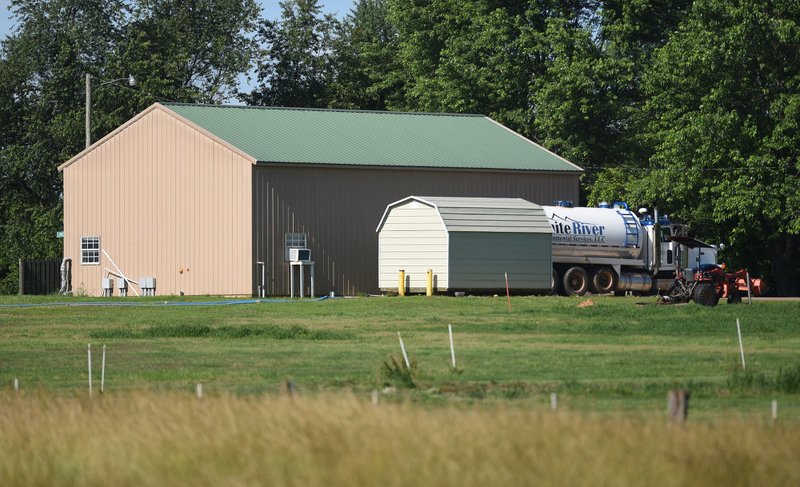BETHEL HEIGHTS -- The city spent $280,828 in August and September to get its two wastewater treatment plants into compliance with state permits, according to documents provided by the city.
The amount is 44% of the $635,925 in expenditures budgeted in the city's sewer funds for all of this year. Revenue was budgeted at $687,950.
Restoration costs
Invoices provided by Bethel Heights showed what the city spent in August and September to repair its wastewater plants. Here’s where the money went:
• Hauling water from plant, $54,230
• Treatment at NACA, $1,944
• Labor, supplies for repairs, $154,928
• Weekly testing, $2,661
• Engineering fees, $38,141
• Legal fees, $28,924
Source: Bethel Heights
Mayor Cynthia Black said Oct. 9 the city has money in its general fund budget and reserve to cover any deficits in the sewer fund.
She declined to detail the amount available in reserve, adding Monday the city doesn't have a specific reserve fund. The city's 2019 $1.6 million general fund budget anticipates $200,000 remaining unspent.
The city also faces $122,000 in fines levied by the state for permit violations. A hearing is set for Oct. 31 in front of an administrative judge with the Pollution Control and Ecology Commission to hear the city's appeal of the fines.
The city's two wastewater plants have operated for at least five years out of compliance, according to records from the state. An inspection in February prompted the Arkansas Department of Environmental Quality to require the city to truck wastewater from the plant and have it treated elsewhere.
Orenco, the company designing the wastewater system for the city, noted in an Oct. 10 report disrepair and capacity overloads were affecting the operation of the plants. Company representatives visited Bethel Heights on Sept. 10 to inspect the plant.
The company completed similar inspections in 2015, 2016 and 2017, according to the company.
"The conditions noted during Orenco's earlier visits were generally still existing," according to the 2019 report.
The $122,000 in fines were levied after city officials didn't report weekly test results taken at the plants.
Inspections and testing since January have repeatedly revealed wastewater pooling on the surface of the fields used as part of the treatment process and high levels of E. coli and coliform in the wastewater.
Jacob Harper, a media and communications manager with the state agency, said Oct. 10 the treatment plants continue to operate out of compliance despite the city's efforts.
"That's what they say, yes," Black said when asked about the state's findings.
The city spent $56,174 in August and September to haul and treat elsewhere wastewater from its plants, according to invoices provided by the city to Environmental Quality.
The state ordered Bethel Heights on Aug. 6 to remove 25% of its 80,000 gallons of wastewater daily from its plants. The Northwest Arkansas Conservation Authority treatment plant in south Bentonville recorded 816,300 gallons of wastewater received from Bethel Heights in August and September.
The state agency loosened the requirement Sept. 17. Wastewater must be removed by truck as needed when the system is down for maintenance or the area receives heavy rain, it said.
Bethel Heights offers its own sanitary sewer service for its residents, which serves about 650 customers, according to Black. The wastewater system consists of a septic tank-pumped sewage collection system. Wastewater is collected from the sewage system and sent to one of two treatment facilities. Large solids and wastes are removed, and the treated water runs through a series of pipes just below the ground on several acres.
The treated water is slowly dripped to release it into soil just below the surface.
Documents from Environmental Quality record sewage surfacing in fields where the treatment system is buried as early as August 2013.
"We are working diligently on our fields hoping to complete the work as quickly as possible," Black said.
Her Oct. 14 progress report to the state said the city has reshaped drip line trenches, installed new drip line tubing and replaced pumps and pump motors.
She said the drip fields need grading and seeding, and then the city will turn its attention to the treatment side of the plant.
Invoices show the city spent $193,069 in August and September on engineering services, labor and supplies to repair the plants.
Weekly testing required by the state cost $2,661 in the two-month period. The city paid $28,924 in legal fees in defense of the $122,000 fines. Lawyers hired by the city also have filed court motions to block annexation of one family's land from Bethel Heights into Springdale.
Black said city staff and engineers hired by the city work at the treatment plants daily to bring them into compliance, but she couldn't give a completion date.
Environmental Quality asked Springdale Water Utilities on June 4 to refuse water service for new customers in Bethel Heights. Projects already permitted for the system were connected, but new developments won't be hooked up until the sewer system is in compliance.
Bethel Heights must get the problem with its wastewater treatment resolved if they want to keep developing, said Jeff Cooperstein, a research assistant for the Center for Business and Economic Research at the University of Arkansas.
A business owner will examine the infrastructure of anywhere he plans development. Uncertainty about the future affects his decision.
"Uncertainty is not a friend of business," Cooperstein said.
NW News on 10/20/2019

